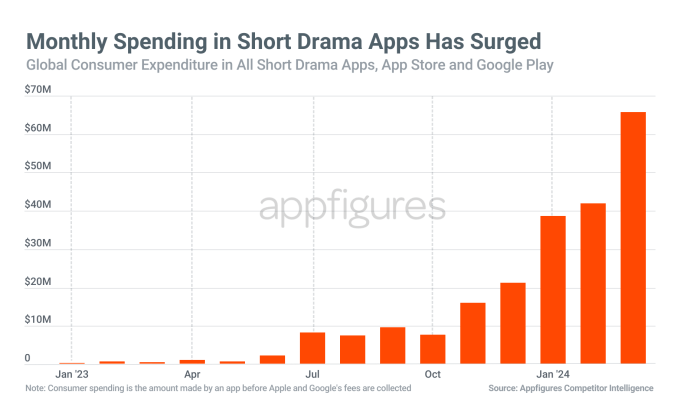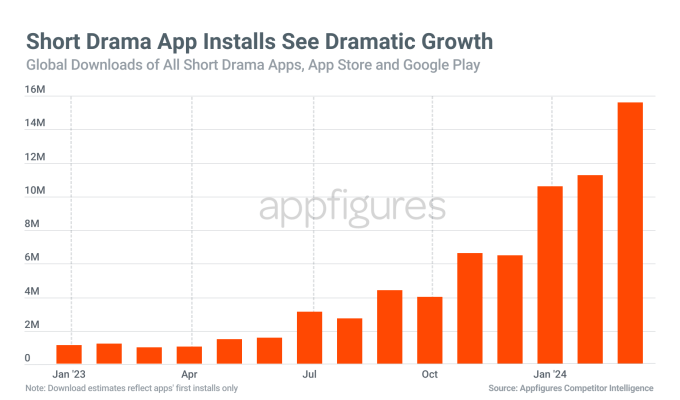[ad_1]
Was Quibi just ahead of its time? Quibi founder Jeffrey Katzenberg ultimately blamed the COVID-19 pandemic for the failure of his short-form video app, but maybe it was just too soon. New app store data indicates that the idea Quibi popularized — original shows cut into short clips, offering quick entertainment — is now making a comeback. In the first quarter of 2024, 66 short drama apps like ReelShort and DramaBox, pulled in record revenue of $146 million in global consumer spending.
This represents an over 8,000% increase from $1.8 million in the first quarter of 2023, when just 21 apps were available, according to data from app intelligence firm Appfigures. Since then, 45 more apps have joined the market, earning approximately $245 million in gross consumer spending and reaching some 121 million downloads.

In March 2024 alone, consumers spent $65 million on short drama apps, a 10,500% increase from the $619,000 spent in March 2023.
It appears the revenue growth began to accelerate in fall 2023, per Appfigures data, leading to a huge revenue jump between February and March of this year, when global revenue grew 56% to reach $65.7 million, up from $42 million. In part, the revenue growth is tied to the larger number of apps available, of course, but marketing, ad spend and consumer interest also played a role.
The top apps by revenue — ReelShort (No. 1) and DramaBox (No. 2) — generated $52 million and $35 million in Q1 2024, respectively. That’s around 37% and 24% of the revenue generated by the top 10 apps, also respectively.
No. 3 app ShortTV grossed $17 million globally in Q1, or 12% of the total.
What’s interesting about these apps, compared with Quibi’s earlier attempt to carve out a niche in this space, is the content quality. That is, it’s much, much worse than Quibi’s — and Quibi’s was not always great. As TechCrunch wrote last year when describing ReelShort, the stories in the app are “like snippets from low-quality soaps — or as if those mobile storytelling games came to life.”
Regardless of the terrible acting and writing, the apps have seemingly found a bit of an audience.

By both installs and revenue, the U.S. is by far the leader in terms of top markets for this cohort. But overall, the charts vary in terms of which countries are downloading versus paying for the content.
By installs, the top markets after the U.S. are Indonesia, India, the Philippines and Brazil, while the U.K., Australia, Canada and the Philippines make up the top markets by revenue, beyond the U.S.
In Q1 2024, short drama apps were installed nearly 37 million times, up 992% from 3.4 million in Q1 2023. By downloads, ReelShort and ShortTV are the top two apps, with the former accounting for 37% of installs, or 13.3 million, and the latter with 10 million installs, or 27%. DramaBox, No. 2 by consumer spending, was No. 3 by installs with 7 million (19%) downloads.

Image Credits: Appfigures
Mirroring wider app store trends, the majority of the revenue (63%) is generated on iOS, while Android accounts for the majority (67%) of downloads.
Though there’s growth in this market, these apps see nowhere near the attraction that their nearest competitors — short-form video and streaming video — do. Short drama apps claimed a 6.7% share of the total across all three categories combined, up from 0.15% a year ago. But the wider video app market makes a lot more money.
For instance, the top 10 apps across the combined three categories, which include apps like TikTok and Disney+, made $1.8 billion in Q1.


Image Credits: Appfigures
[ad_2]
Source link
